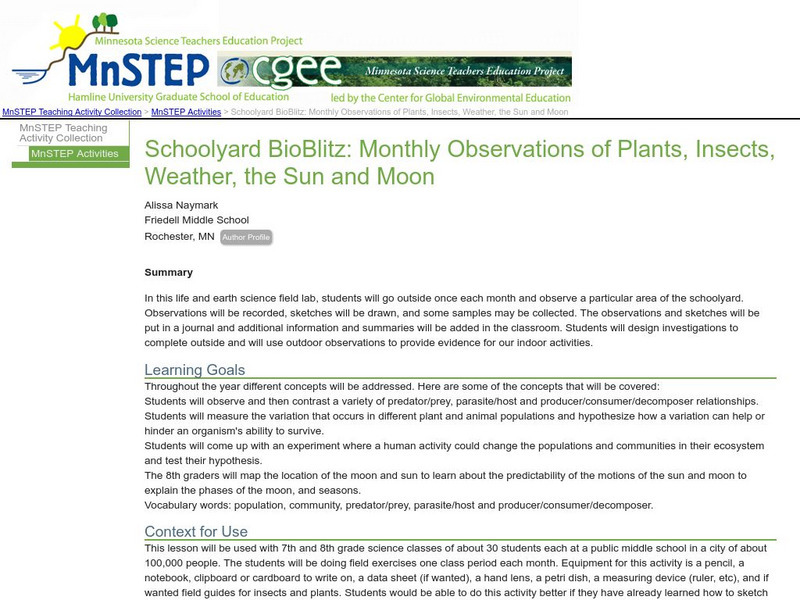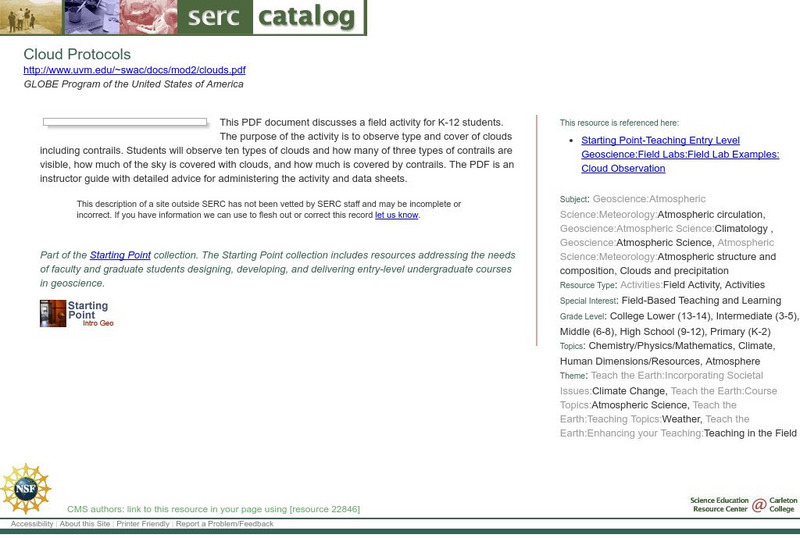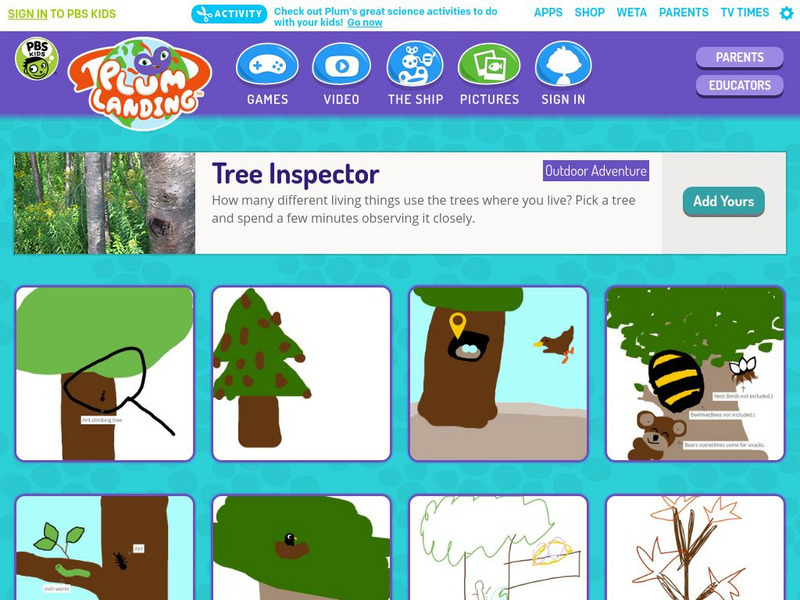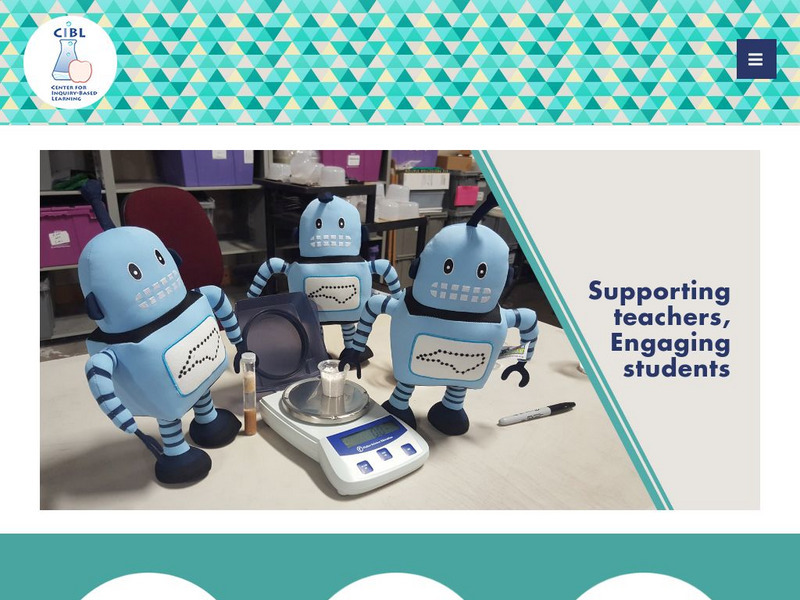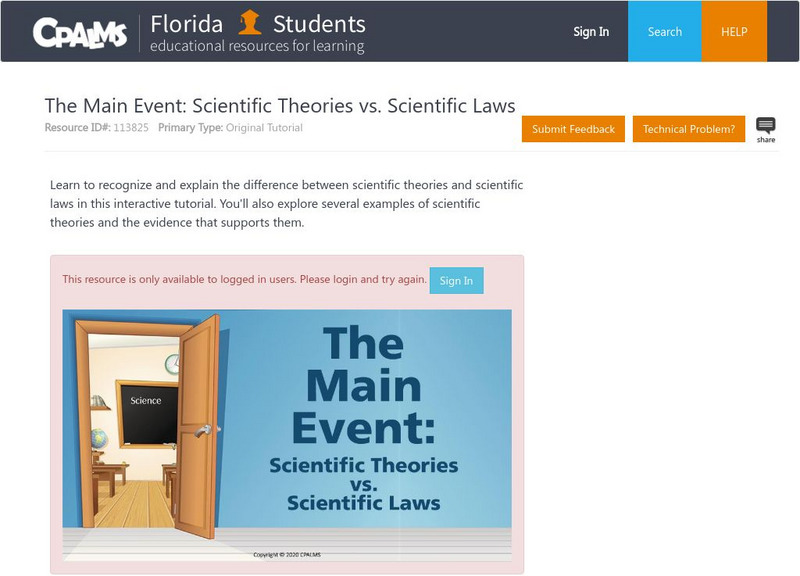Science Education Resource Center at Carleton College
Serc: Minnehaha Falls: Observing Changes in Nature Through Drawing and Writing
Students will take a nature field trip to practice their observational skills and then communicate their findings through drawing, writing, and sharing.
Science Education Resource Center at Carleton College
Serc: Bubbling Blobs
In this chemistry lab, students investigate how oil and water don't mix. They will work on their observation skills and their ability to follow directions to ensure they get the correct results. Students can then develop a new, testable...
Science Education Resource Center at Carleton College
Serc: Mn Step: Schoolyard Bio Blitz
For this activity, students visit a small section of the schoolyard and record observations in a scientific journal. They will observe different things as the school year progresses, including ecological relationships, human impact on...
Science Education Resource Center at Carleton College
Serc: Cloud Protocols
Young scholars observe ten types of clouds and visible contrails, and determine how much of the sky is covered with clouds or contrails.
SRI International
Performance Assessment Links in Science: Rain Drops
Students make predictions and test the effect water has on various building materials. Seven different building materials, a hand lens and a dropper are required. This activity only takes 15 minutes.
SRI International
Performance Assessment Links in Science: Up, Up and Away (Lesson)
Students will observe water evaporation in this performance task, and investigate the water cycle. The task is designed for Grade Two.
Cynthia J. O'Hora
Mrs. O's House: Mystery Object Challenge
With a brief story and photo of an image, students will do some digging to figure out how old the object pictured is and the history behind it.
PBS
Pbs Kids: Plum Landing: Plant Inspector
Students will provide a verbal and visual description of plants that are close their homes. The pictures can be published online.
PBS
Pbs Teachers: Runaway Universe
Use this activity to model how scientists use indirect observations to define problems that are not directly measurable.
University of California
Understanding Science: Science Relies on Evidence
Discover how important it is for science to rely on evidence, and what types of evidence is acceptable.
Other
U.s. Forest Service: Discover the Forest: Forest Snapshot Game
Students manipulate a camera to take photographs of animals they observe in three forest scenes.
National Health Museum
Access Excellence: Becoming a Scientist
Access Excellence invites you to explore the life of a scientist, career paths, and activities that allow you to think like a scientist.
PBS
Pbs Kids: Plum Landing: Tree Inspector
This PBS Kids activity is an extension of a Plum Landing episode featuring trees. Students will use the online tools to draw a tree that they closely observe.
University of Washington
Washington U: Model for Conducting Scientific Research
This page outlines the scientific method, step by step.
Scholastic
Scholastic: Study Jams! Science: Scientific Inquiry: Scientific Methods
A video that explains the steps involved in the scientific method. Includes a karaoke song with lyrics, a quiz to test students' knowledge, and vocabulary definitions.
Other
Duke: Center for Inquiry Based Learning
Duke University has established the Center for Inquiry-Based Learning. It serves to enhance math and science lessons. Click on Resources for good examples of Inquiry-based lesson plans.
Sophia Learning
Sophia: What Is Physics?: Lesson 4
This lesson describes how physics has developed throughout history and how it helps describe the world around us. It is 4 of 6 in the series titled "What is Physics?"
Science Education Resource Center at Carleton College
Serc: Cube Puzzle and Toilet Paper Roll Model in Teaching the Nature of Science
This lesson incorporates inexpensive materials such as carton boxes, toilet paper roll tube, strings and toothpicks. It engages students to conduct pattern observation, prediction, testing and ends up with a model construction. It also...
Science Education Resource Center at Carleton College
Serc: Scientific Observation Activity
For this structured exercise, young scholars are asked to observe the world around them and make an observation about any sort of process they see. They then ask a how or why question about their observation, and follow that by three or...
American Geosciences Institute
American Geosciences Institute: Earth Science Week: Sky and Cloud Windows
In this activity, learners will conduct experiments or participate in demonstrations to answer questions about sky and weather phenomena.
CPALMS
Florida State University Cpalms: Florida Students: Scientific Laws
Scientific law is defined and contrasted to societal laws. Examples are given.
CPALMS
Florida State University Cpalms: Florida Students: Models in Science
An explanation of what models are and how using them benefits science. Examples are given.
CPALMS
Florida State University Cpalms: Florida Students: Scientific Laws and Theories
Differentiate between scientific laws and theories. Identify examples of scientific theories and use evidence to support them.


